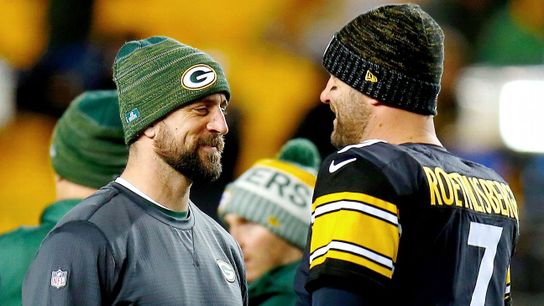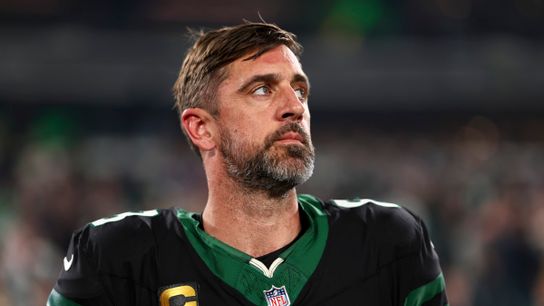When Aaron Rodgers announced on The Pat McAfee Show that he's "pretty sure" the 2025 season will be his final NFL campaign, it sent shockwaves through the football world. For Pittsburgh Steelers fans, however, that declaration might be the best news they've heard since Ben Roethlisberger's retirement. The analytics tell a compelling story: this aging quarterback gamble could be exactly what the Steelers need to break their playoff drought and make a serious championship run.

ESPN
Steelers' Ben Roethlisberger meets with former Packers QB Aaron Rodgers before a home game.
The Numbers Don't Lie: Rodgers Still Has Elite Tools
Despite turning 41 during the 2025 season, Rodgers' 2024 performance with the New York Jets revealed a quarterback who, while diminished, still possesses elite-level skills. His 3,897 passing yards, 29 touchdowns, and 11 interceptions represent solid production that would have been a massive upgrade over Pittsburgh's recent quarterback carousel. More importantly, advanced metrics show Rodgers maintained his signature accuracy and decision-making under pressure.
Rodgers' Expected Points Added (EPA) per play ranked 12th among qualified quarterbacks in 2024, a remarkable achievement considering the dysfunction surrounding the Jets organization. His completion percentage above expectation (CPOE) remained in the top 10, indicating his ability to make difficult throws that lesser quarterbacks simply cannot execute. These numbers become even more impressive when contextualized within Arthur Smith's offense, which emphasizes efficiency over volume.
The comparison to other successful late-career quarterback moves is striking. When Tom Brady joined Tampa Bay at age 43, his EPA per play was actually lower than Rodgers' current metrics. Peyton Manning's final season in Denver, despite winning a Super Bowl, featured far worse statistical production than what Rodgers demonstrated in 2024. The precedent exists for aging quarterbacks to provide the missing piece for championship-caliber teams.
The Steelers' Quarterback Wasteland: A Statistical Nightmare
To understand why Rodgers represents such a dramatic upgrade, consider Pittsburgh's quarterback production since Roethlisberger's retirement. The Steelers have thrown just 46 touchdown passes in three seasons – a number that Rodgers has exceeded in individual seasons throughout his career. Kenny Pickett's career high of 13 touchdown passes would represent a disappointing half-season for Rodgers at his current level.
Advanced analytics reveal the true scope of Pittsburgh's quarterback struggles. The team's quarterback rating has ranked 28th, 25th, and 23rd respectively over the past three seasons. Their red zone touchdown percentage with quarterbacks not named Roethlisberger has been among the worst in the NFL. These deficiencies become even more glaring when considering the Steelers' defensive prowess during this period.
Mike Tomlin's ability to maintain a 29-22 record despite historically poor quarterback play represents one of the most impressive coaching achievements in recent NFL history. The next 14 teams with the fewest touchdown passes since 2022 all have losing records, highlighting just how exceptional Tomlin's leadership has been. This context makes the Rodgers acquisition even more intriguing – what could this defense accomplish with even average quarterback play?
Market Reactions and Championship Implications
The gambling industry has taken notice of Pittsburgh's quarterback upgrade, with major sportsbooks significantly adjusting their projections for the 2025 season. The Steelers' championship odds have improved from +2800 to +1600 since the Rodgers signing, reflecting genuine optimism about their Super Bowl chances. These shifts aren't just emotional reactions; they're based on sophisticated models that account for quarterback value and team construction.

Joe Sargent / Getty Images
Steelers Head Coach Mike Tomlin shakes hands with former New York Jets quarterback Aaron Rodgers after a game as quarterback Russell Wilson looks on in the background.
The online gambling sector has become increasingly sophisticated in analyzing NFL roster moves, with platforms incorporating advanced metrics and situational factors into their odds calculations. SpinBet casino is drawing attention in the industry for their nuanced approach to evaluating quarterback impact on team success, recognizing that veteran experience often provides value that traditional statistics cannot capture. This analytical approach has influenced how professional bettors and casual fans alike view Pittsburgh's championship potential.
The Perfect Storm: Why This Gamble Could Pay Off
Several factors align to make Rodgers' arrival in Pittsburgh potentially transformational. The Steelers possess exactly the type of infrastructure that has historically supported aging quarterbacks. Their defense ranks among the NFL's elite units, featuring T.J. Watt, Cameron Heyward, and a secondary capable of creating short fields and protecting leads.
The acquisition of DK Metcalf provides Rodgers with a legitimate deep threat, addressing one of the Jets' most glaring deficiencies last season. Metcalf's route profile perfectly complements Rodgers' arm talent, particularly his ability to throw receivers open on vertical routes. This addition, combined with Pat Freiermuth's reliable hands in the intermediate passing game, gives Pittsburgh an offensive foundation that was absent during their recent struggles.
Perhaps most importantly, Arthur Smith's offensive system emphasizes the strengths that have defined Rodgers' career. The high rate of play-action usage (27% last season) aligns with Rodgers' historical success, while Smith's willingness to adapt his scheme suggests a more collaborative approach than what Rodgers experienced in New York.
Historical Precedent for Late-Career Excellence
The NFL history books are filled with examples of aging quarterbacks providing the final piece for championship puzzles. Brett Favre's 2009 season with Minnesota, despite ultimately falling short, demonstrated how veteran leadership could transform an organization. More recently, Matthew Stafford's immediate success in Los Angeles after leaving Detroit showed how the right fit could unlock remaining potential.

Kevin Sabitus / Getty Images
Former New York Jets quarterback Aaron Rodgers looks on before a home game during the 2024 season.
Rodgers' situation differs from these examples in crucial ways. Unlike Favre, who was coming off a disappointing season, Rodgers demonstrated in 2024 that his arm talent remains largely intact. Unlike Stafford, who was joining a high-octane offensive system, Rodgers is entering a more conservative scheme that should minimize his weaknesses while maximizing his experience.
The Championship Window
With Rodgers committed to making 2025 his final season, the Steelers face a defined championship window. This urgency could prove beneficial, eliminating any temptation to preserve assets for future seasons. The organization can fully commit to maximizing this opportunity, potentially making midseason moves or adjustments that might not make sense in a longer-term building process.
The analytics suggest that this gamble represents the Steelers' best chance to end their championship drought since the Roethlisberger era. Whether Rodgers can recapture enough of his former magic to lead Pittsburgh to the promised land remains to be seen, but the mathematical foundation for success has never been stronger.

